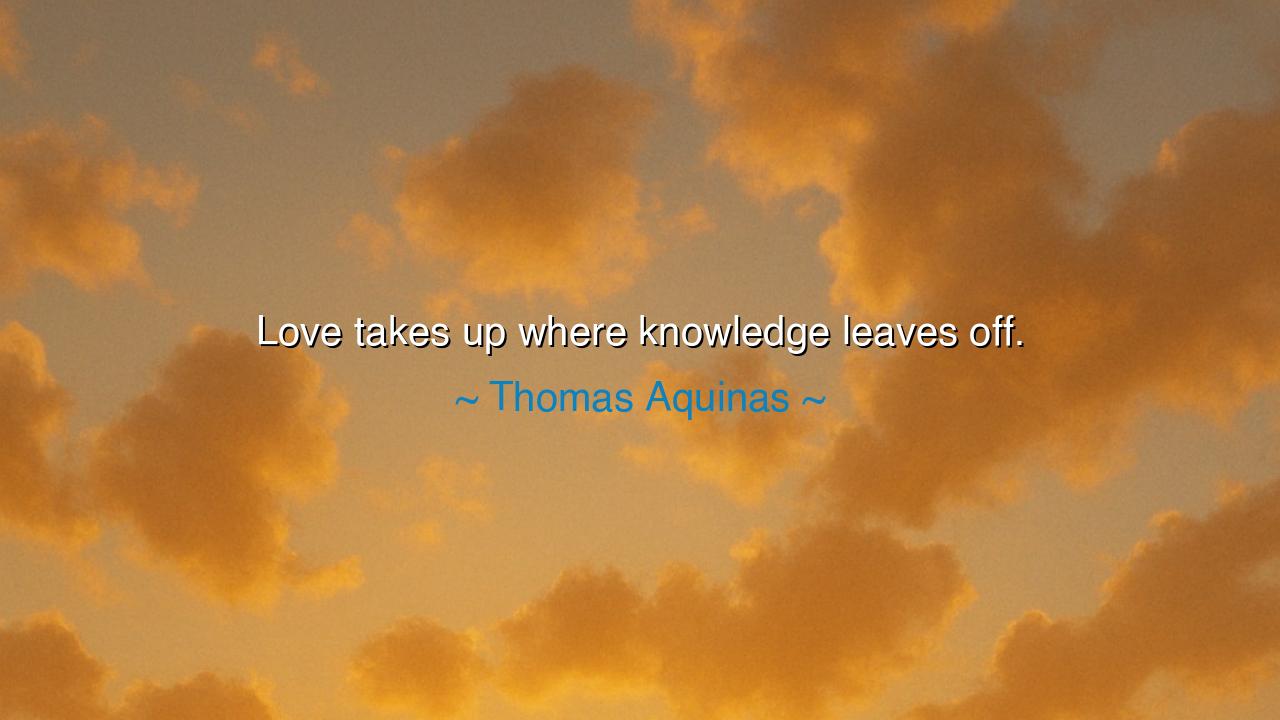
Love takes up where knowledge leaves off.






“Love takes up where knowledge leaves off.” — Thomas Aquinas
In this sacred and eternal utterance, Thomas Aquinas, the angelic doctor of the Church and one of the greatest philosophers of all time, unveils a truth that transcends both intellect and theology. His words remind us that the mind, though powerful, has its limits — and beyond those limits, the heart must lead. Knowledge, he tells us, can take us far along the path of understanding, revealing the structure of the universe, the logic of creation, and the nature of good and evil. But when the intellect has reached the edge of its light, when reason falters before the mysteries too vast for words, it is love that carries the soul forward. For love is not bound by comprehension; it is the flame that rises where the mind can no longer climb.
The origin of this insight lies deep within Aquinas’ spiritual philosophy, born of his study of faith, reason, and the divine. Living in the thirteenth century, a time when scholars sought to reconcile the wisdom of Aristotle with the revelation of Christ, Aquinas stood as a bridge between knowledge and faith. He believed that reason and intellect were divine gifts — sacred tools by which man could come to know the world and even approach God. But he also saw that reason had a boundary — a horizon beyond which the infinite could not be measured. There, in that silent space beyond all understanding, love begins its reign. For love does not analyze; it unites. It is the soul’s ascent beyond knowing, the final surrender of the finite to the infinite.
To grasp this truth, one need only look at the story of Mother Teresa of Calcutta. She did not possess the learning of philosophers, nor did she seek to solve the mysteries of theology with argument. Instead, she lived what Aquinas taught — she let love take up where knowledge left off. In the streets of poverty, among the dying and the forgotten, she did not ask, “Why does suffering exist?” She simply loved. Her compassion reached beyond reason, beyond logic, into the sacred realm where love becomes a form of divine knowing. Through her deeds, the world learned that love is the highest wisdom — that to serve and to feel compassion is to understand life more deeply than intellect ever could.
Knowledge, for all its brilliance, can only describe what is; it cannot always touch what is true. The scientist may study the anatomy of a heart, the philosopher may define justice, the theologian may explain faith — but only love can breathe life into these concepts. For love sees with a vision beyond the senses. It perceives beauty where reason sees imperfection, hope where logic sees despair. It is love that forgives when the mind demands judgment, that gives when reason warns to withhold, that believes even when evidence says there is no cause. This is what Aquinas meant: that when human understanding ends, divine love begins.
Yet Aquinas’ words also carry a gentle warning. He reminds us not to worship knowledge as an idol. The mind, in its pride, often believes it can explain all things, control all forces, and conquer all mysteries. But knowledge without love is cold, sterile, and incomplete. It builds machines but forgets hearts; it reaches the stars but neglects the soul. Love, however, gives purpose to knowledge — it directs it toward goodness, healing, and unity. Without love, knowledge becomes power without mercy; with love, it becomes wisdom in service to life.
Therefore, dear listener, let this truth take root in your spirit: seek knowledge, but do not stop there. Let every fact you learn, every truth you uncover, lead you closer to love. For the highest understanding is not achieved by reason alone, but by compassion. When you study the world, remember the people who live within it. When you pursue truth, do so not to boast, but to bless. Let love be the completion of your knowledge, as the flame completes the candle.
And so, the lesson of Aquinas is this: the heart must follow where the mind can no longer lead. When you have read all the books, pondered all the mysteries, and still find the world too vast for reason, do not despair. Simply love — for in that act, you will know more than knowledge could ever teach. For in love, we touch the infinite; in love, we glimpse the face of truth itself. Thus, as Aquinas declared, and as the wise through all ages have echoed, “Love takes up where knowledge leaves off.” It is not the end of understanding — it is its fulfillment, its flowering, its divine continuation.






AAdministratorAdministrator
Welcome, honored guests. Please leave a comment, we will respond soon